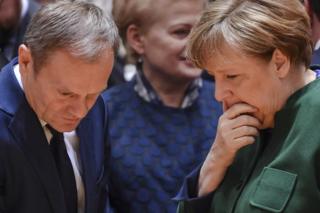 Image copyright
Image copyright
AP
Polish domestic politics have clouded the summit. Donald Tusk is seen here with German Chancellor Angela Merkel
EU leaders are meeting – without the UK – to try and forge a common vision for Europe, as serious tensions make 2017 one of the bloc’s toughest years ever.
The Polish government’s fury at the reappointment of fellow Pole Donald Tusk as European Council head meant there was no consensus on Thursday.
The conclusions – normally an expression of EU unity – came instead from Mr Tusk personally.
He referred to reasons “unrelated” to the substance of the summit.
A long-running feud between him and Jaroslaw Kaczynski – the nationalist guiding the current Polish government – caused the latest debacle.
On 25 March, the 27 EU leaders meet in Rome, to mark 60 years since the founding of the European Economic Community with the Treaty of Rome.
But shortly after that, the UK plans to trigger Brexit, the first withdrawal of a member state, a process fraught with risk and uncertainty.
Under a shadow: Analysis by Kevin Connolly, BBC News
Image copyright
Getty Images
Theresa May was at the summit on the first day
When the idea of an EU celebration of the 60th anniversary of the founding Treaty of Rome in the Italian capital was first mooted it must have seemed like a good idea.
Now Brexit casts a long, dark shadow over those proceedings – an organisation that has known nothing but steady expansion is about to lose a member state for the first time.
That is a confidence-sapping thought for an institution which has no firm timetable for planned future expansion in the Balkans.
There is no big idea on offer from the European Commission – just a palette of five vague outlines of how the EU will work in the future. The moment does not feel right for grand visions.
Then there is the Polish government’s anger at the re-election of their fellow-countryman Donald Tusk to a top job at the European Council. Poland – a huge beneficiary of EU funding – suddenly feels as though it might take the place in the European awkward squad that the UK is vacating.
Over the years, the UK’s distance from the EU on many key issues – including the euro, the Schengen passport-free zone and budget spending – has contributed to a multi-speed Europe.
There is a legal mechanism for a smaller group of countries to forge ahead with a common policy.
That was demonstrated again at this summit with agreement that 17 member states could set up a European Public Prosecutor’s Office – seen as a way to combat VAT fraud.
EU Commission President Jean-Claude Juncker spoke of a multi-speed future as one of the EU’s strategic options.
But Poland and its former communist neighbours fear being left behind if their stronger partners integrate in more areas, especially the eurozone.
Poland is the biggest net recipient of EU funds – in 2015 it got €13.4bn (£11.7bn; $14.2bn) from the EU.
Polish Prime Minister Beata Szydlo said there was “no place for a multi-speed Europe”.
And other centrifugal forces are at work in the EU: how to handle the migrant crisis, how to deal with resurgent Russian power and especially how to rein in resurgent nationalism in many countries.
Euroscepticism is part of wider criticism of the liberal economic order, amid deep inequalities and chronic unemployment in much of Europe.
EU summit: A Polish political row hampers work as Brexit looms

